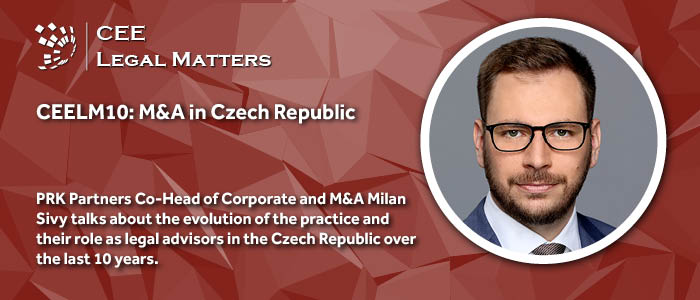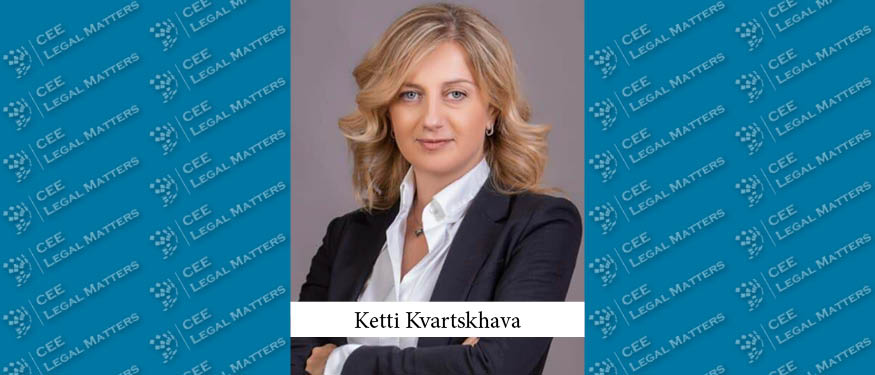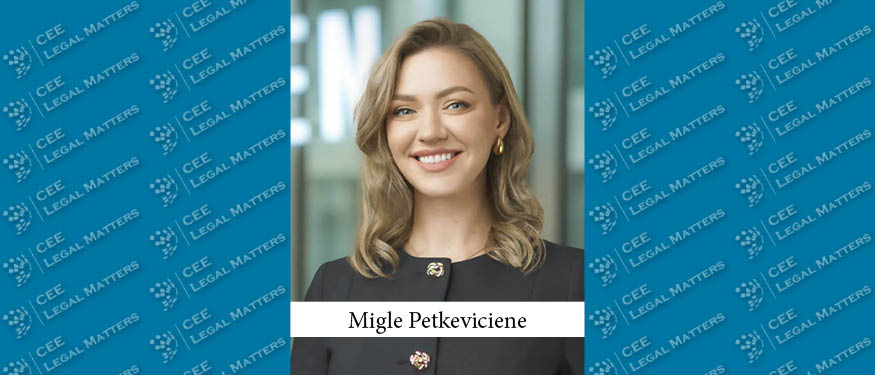PRK Partners Co-Head of Corporate and M&A Milan Sivy talks about the evolution of the practice and their role as legal advisors in the Czech Republic over the last 10 years.
CEELM: As we reflect on the past 10 years, what types of projects have kept your M&A team busy during this time?
Sivy: Firstly, when speaking about M&A transactions, while mergers remain relevant, our team was mostly focused on acquisition processes as they’ve been prevalent in the market. As for the sectoral focus, from our perspective a decade ago, the energy sector dominated the M&A scene, with robust activities in the field. However, our engagements over time evolved toward diverse industries such as finance, real estate, media, manufacturing, agriculture, and venture capital. In recent months, we’ve seen a resurgence of interest in the energy sector, with two significant transactions involving underground gas storage facilities and the sale of the gas transmission system operator to CEPS – a company owned by the Czech state. Among other reasons, this was due to both regional and geopolitical dynamics and shifts in the broader financial market (including the relevant interest rates).
CEELM: Looking back at the last 10 years, what have been your and your team’s most intense periods, and what do you believe led to them?
Sivy: Throughout these years, the deal flow generally maintained a steady level – with the exception of a few extraordinary periods that brought unique challenges. Especially, the COVID-19 era disrupted the regular deal flow. Many deals were temporarily halted as uncertainty gripped the market.
From our viewpoint, certain periods stood out – notably around 2021-2022. These years were marked by increased activity post the second wave of the COVID-19 pandemic. The aftermath of the crisis witnessed a surge in deal-making as investors sought opportunities in the market and benefited from accumulated capital.
CEELM: How have client profiles evolved over the last decade, and what shifts have you observed in their needs and expectations?
Sivy: We’ve seen a stable blend of international and local clients. In our experience, larger transactions in the Czech Republic and the broader CEE region are often carried out by big international players, including funds and strategic investors. Meanwhile, local players tend to focus on a larger number of smaller and mid-sized transactions.
The complexity of deals has seen a significant uptick, accompanied by heightened expectations from clients. We are now expected to navigate complex negotiations, bidding procedures, and increasingly common cross-border aspects. It’s worth noting that Czech companies are often progressively expanding their horizons and investing abroad. Therefore, there is a need for legal advisors to adapt to the changing dynamics of client needs, both when representing Czech clients as well as when assisting the prospective purchaser with the due diligence review of the Czech target which often has activities abroad.
CEELM: From a legislative and regulatory standpoint, what were the main recurring challenges faced in making deals happen over the last decade?
Sivy: From a legal perspective, the past decade has seen relative stability. A big development was the adoption of a new civil code in 2014. While it introduced many changes to Czech civil law and challenges in transactional documentation, it didn’t disrupt the fundamental stability of the legal landscape.
Moreover, regulatory reviews, including merger clearances, foreign direct investment approvals, and a new set of rules addressing distortions caused by foreign subsidies, have become integral components of the transactional process.
Last but not least, ESG aspects are becoming increasingly important in the case of most M&A transactions.
CEELM: Looking to the future, what do you anticipate will be the highlights in a similar interview 10 years from now?
Sivy: In the future, several themes might be looked back at as highlights. AI is expected to play a pivotal role in M&A transactions, extending beyond due diligence to various facets of the process. The implementation of AI in the transactional period could revolutionize how deals are structured and executed.
Another noteworthy aspect is the introduction of a new tax package in the Czech Republic, altering the taxation landscape for shares and ownership interests in the Czech companies held by individuals. The potential impacts of this tax regime are currently under evaluation, and while there is uncertainty, we remain cautiously optimistic about the Czech market’s resilience in adapting to these changes.
Geopolitical situations, such as the ongoing conflict in Ukraine, are factors that one cannot ignore. While there is a strong hope for de-escalation, geopolitical developments will undoubtedly shape the landscape of M&A in the years to come.
PRK Partners is CEE Legal Matters' Practice Leader for Corporate/M&A in the Czech Republic for 2024 – learn more here.
This article was originally published in Issue 10.11 of the CEE Legal Matters Magazine. If you would like to receive a hard copy of the magazine, you can subscribe here.













